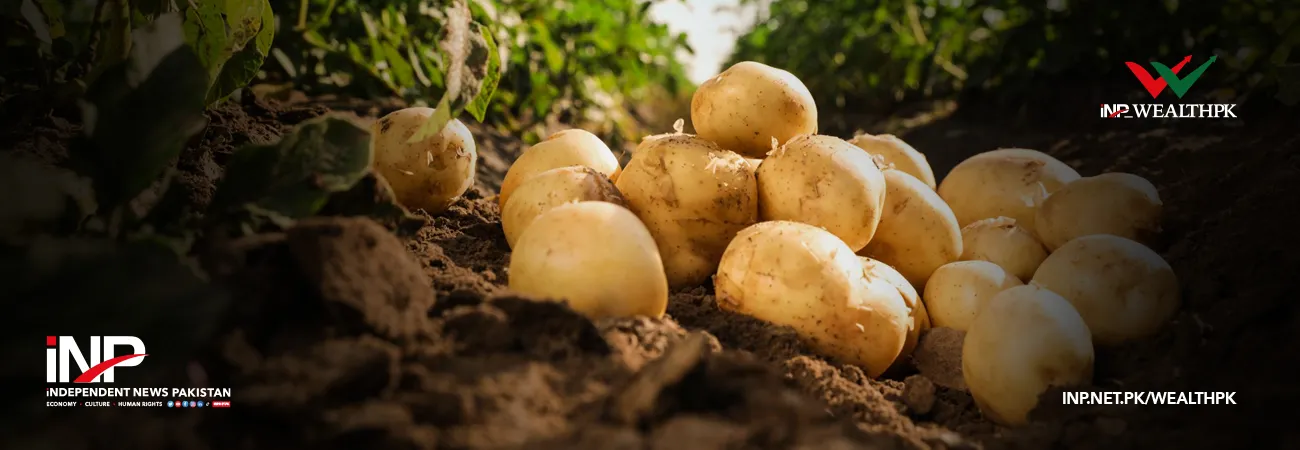INP-WealthPk
Arsalan Ali
Pakistan has great potential to convert potatoes into value-added products, increase exports, and create jobs, according to a latest report of Pakistan Business Council (PBC). The report said that Pakistan primarily produces potato crisps and French fries on a large scale, while manufacturing of potato starch and other value-added products is limited. It said that by improving the availability of affordable and high-quality potato seed, Pakistan can enhance potato yield and compete with other countries. Currently, most farmers in Pakistan rely on seeds passed down through generations, making their crops susceptible to diseases and blight, resulting in lower output. The high cost of procuring certified seeds makes them unaffordable for many farmers, who often opt for cheaper informal seeds.
The government’s in-vitro laboratories and seed multiplication centres have limited production capacity and lack commercial viability. Encouraging formal seed multiplication companies and providing a supportive regulatory environment can help meet the local seed demand. Improving technology adoption in potato cultivation, such as implementing drip irrigation to replace suboptimal canal water flooding, can enhance productivity. The government can collaborate with the private sector to develop financing mechanisms that promote the adoption of better technologies and seeds, leading to an increase in farming efficiency and higher potato yields. One of the key limitations facing potato processing in Pakistan is the lack of suitable potato varieties.
Only a small percentage of potatoes harvested in Pakistan belong to industrial-grade varieties. The suitability of a potato variety for processing depends on factors like dry matter content, colour, length and shape. Because of the lack of demand, knowledge and access to capital, farmers do not grow other industrial varieties. Farmers in Pakistan, other than those who work with reputed processors, rely mainly on seeds sourced from the informal sector, hence resulting in low quality harvests. They also practice flood irrigation, which lowers the output and quality of the produce. Import of potato seeds has increased in recent years, which further accentuates the need for local production of high-quality seeds. Potato cultivation in Pakistan has seen significant growth over the past decade with an increase in both production and the total cultivated area.
The total production of potatoes in Pakistan has doubled in the last decade, primarily due to increased cultivated area rather than higher yields per acre. Pakistan’s yield per acre is lower compared to Turkey, Iran, and Egypt. To improve output, Pakistan needs to focus on adopting better seed varieties and improving on-farm management. According to a report of Trade Development Authority of Pakistan (TDAP), Central Asian countries are the most lucrative markets for potatoes. Central Asian countries, especially Kazakhstan, are diverting to new potato-exporting countries to meet their demand. The TDAP report said it is the need of the hour to take advantage of and access the market of Central Asia. Moreover, it said, Iraq is also a lucrative market with a positive return. Direct exports of potatoes to Iraq and indirect exports through Iran should be streamlined, the report suggested.
The report also emphasised the usage of high-quality seeds and fertilisers to prevent diseases in order to increase the yield per capita and exports of potatoes. Pakistan’s major potato production is concentrated in Punjab province (93.5%) followed by Khyber Pakhtunkhwa (5.17%), Balochistan (1%), and Sindh (0.33%). Okara district in Punjab and Gilgit (Hunza) are two major potato clusters. According to the Food and Agriculture Organisation (FAO) statistics, China, India, Ukraine, Russia, and the United States are the top five potato-producing countries in the world.
Credit : Independent News Pakistan-WealthPk




